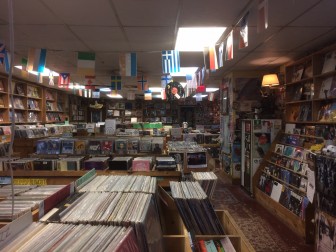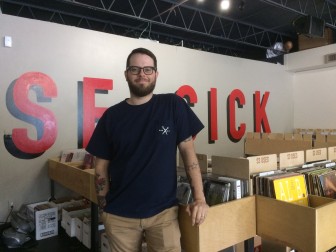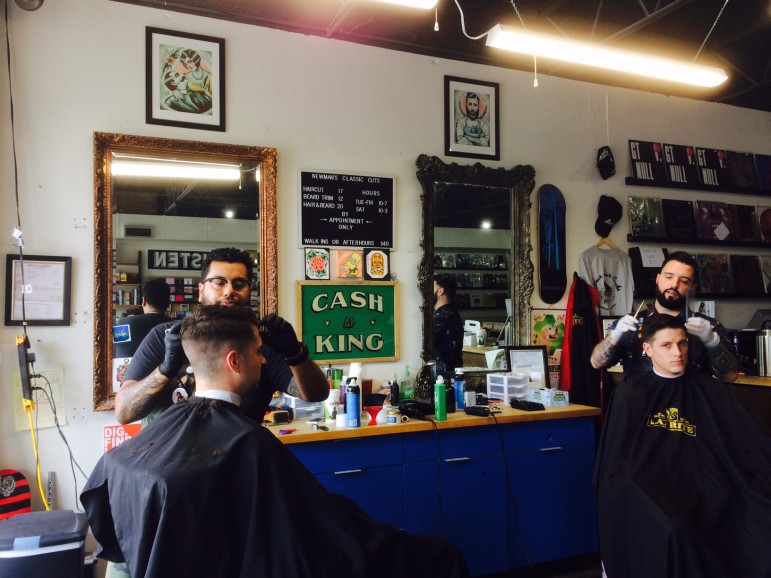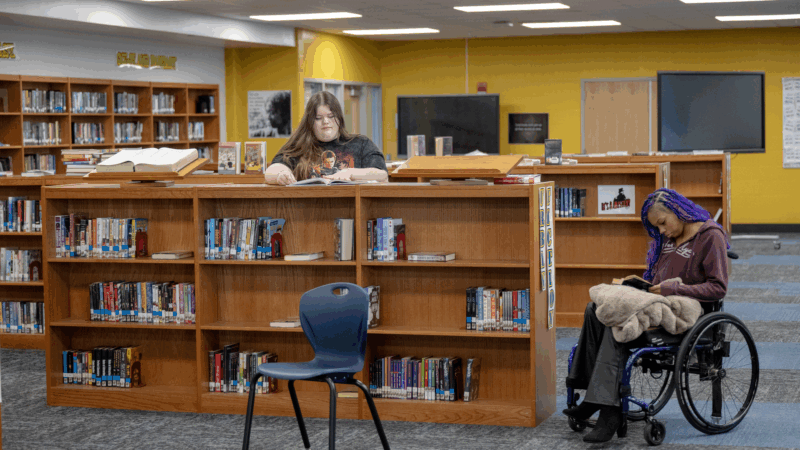Charlemagne Records Celebrates 40 Years
The entrance to Charlemagne Records is through a tiny doorway on 11th Avenue South in Birmingham. If you weren’t looking for it, you’d miss it.
Inside is a maze of record and CD bins that stretches across the creaky floors. There’s even a small box of used tapes for sale to satisfy the die-hards. They also have an old-school Coke machine that still works, but don’t expect old-school prices.
Owner Marian McKay– some may recognize her name from her band Marian McKay and Her Mood Swings– found her musical calling in Paris in the mid-1970s outside Notre Dame Cathedral. She stumbled into a quaint boutique, “and there was this young woman in there and she was ironing her clothes that had just come in and she had her little Dachshund in a bassinet underneath her and I just was looking around I thought, ‘This is what I want to do.’”
Guarding that corner of Paris is a bronze statue of the emperor Charlemagne.
McKay came home to Birmingham and started her own music store. With $500, a few peach crates full of records and a little help from her friends, McKay opened Charlemagne Records in 1977.
“It was my brother’s collection, a friend of mine’s collection and my collection,” McKay remembers. “So we had Grateful Dead, Allman Brothers, my brother had some jazz, and Beatles and Rolling Stones.”
Forty years later, Charlemagne’s walls are lined with new and used vinyl from floor to ceiling. Every corner of the shop whispers with memories: patrons who became friends, that time McKay helped a customer who would later become her husband, and celebrity visits.
“Stevie Ray Vaughn, Carlos Santana, Tom Waits, Robert Cray, Gene Simmons from Kiss,” says McKay.
Through the death and eventual renaissance of vinyl, to the rise of digital music, and even through economic downturns, McKay has kept Charlemagne Records afloat. She says it’s taken determination and great customer service. Daniel Drinkard, owner of Seasick Records in Crestwood agrees and says it’s also the unyielding support of Birmingham residents.
“I think Birmingham in general, outside of just the music scene, is really great at supporting local businesses,” Drinkard says.
He opened Seasick in 2013 and caters to a slightly different audience than Charlemagne. Seasick sells mostly new records, a lot of which are produced by independent and underground artists. Oh, they also have a barber shop inside where customers can get a shave and haircut. Drinkard says there’s also been a cultural shift in how people listen to music, “because, you know, in the early 2000s digital was the cool thing. But it’s kind of impersonal, you know? You know, you don’t have like that connection with it you don’t get to look at the artwork, read through the liner notes and see where it was recorded. That’s kind of the fun of listening to physical for me.”
The warm, scratchy sound a record makes when the needle drops is something you don’t get with digital music. Drinkard says it’s nostalgic and foretelling at the same time. A lot of their customers were born in the 1990s and raised in a world almost devoid of vinyl. He says he hopes that generation will pass the torch so that, like Charlemagne Records, Seasick can also be around for 40-plus years.
What I learned watching every sport at the Winter Olympics
Sit down with pop culture critic Linda Holmes as she watches the 2026 Winter Games. She is exhausted by cross-country, says "ow ow ow" during moguls, and makes the case, once and for all, for curling.
Scientists worry about lasting damage from Potomac sewage spill
Drinking water around the District of Columbia hasn't been contaminated. But scientists say the environmental damage could be severe.
Using saliva to detect disease holds promise, but it’s not perfected yet
Easier than a blood test, saliva tests have the potential to detect cavities, infections and even cancer. But a lack of insurance coverage and other obstacles stand in the way of wider use.
What worked and what didn’t with a cellphone ban at a Kentucky school
Keeping students off their devices is the new norm in many schools. We talked to students and educators at one Kentucky school to see how it's working.
Israeli settlers kill 19-year-old Palestinian American, officials and witnesses say
Israeli settlers in the occupied West Bank shot and killed a Palestinian American man during an attack on a village, the Palestinian Health Ministry said.
Trump says he doesn’t know if aliens are real but directs government to release files on UFOs
President Donald Trump said Thursday that he's directing the Pentagon and other government agencies to release files related to extraterrestrials and UFOs because of "tremendous interest."










